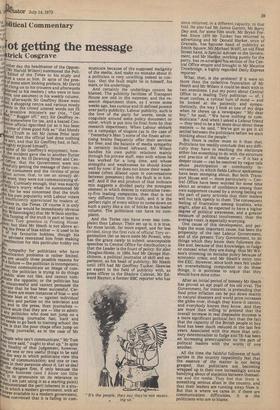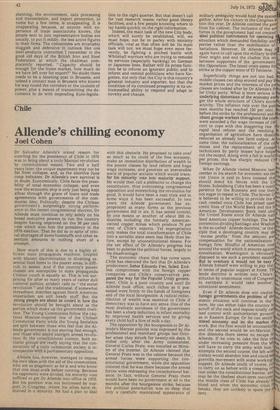, 1 1;1itical Commentary , lot getting the message
trick Cosgrave
Other day the headmaster of the Opposi(Mr Harold Wilson) summoned the PoliEditor of the Times to his study and hed a cane at him. In spite of the presof some stern looking prefects, Mr David jC Clung on to his trousers and afterwards Plained to his readers ( who were in loco ntis, one assumes) in his weekly column. .4,,11,1Y afterwards Sir Geoffrey Howe went "sit a shopping centre and various rowdy ?srients in the crowd uttered words not fit a sensitive minister's ear (viz., " Get ' 'Ited," " Bugger off," etc). Sir Geoffrey rested somewhere for tea, and a heated ConrIVative official described (or so it has been I) some of these good folk as" that bloody d." (Truth to tell Mr James Prior later ested that the official had done nothing , e sort, and that Sir Geoffrey had, in fact, infoughly enjoyed himself). I°I spite of Sir Geoffrey's enjoyment, how1 t, the incident gave rise to another flutter s oncern at No 10 Downing Street and CenOffice, that the Government were not essfully getting the message of their confor consumers and the victims of price :ittion across, that, to use an already deWord, they were not communicating ef',IluvelY. Curiously enough, that was exactly Ne Wilson's worry when he summoned Mr 4,1°d. for he was concerned that the truth )1:9,14 his own popularity with Labour voters Liri insufficiently appreciated by readers of, t Writers in, the Times. Of course it is only Jr: tO add (as would be immediately obvious ,I1LY Wilsonologist) that Mr Wilson attribuinis fuzzing of the truth in part at least to
'
'Ignant Tory gremlins in Printing House 1124,,•are; but then Mr Heath is not above aci"ng the Press of bias either — it used to be of his favourite hobbies, though his 'er advisers restrained him from making Predilection for this particular hobby too oblic. :14,Y sympathy for politicians who have rinunication problems is rather limited. are usually three possible reasons for a failure — the politician is incompetent, ot cannot communicate an image of comY tloe; the politician is trying to do things ti, pUblic does not like, and cannot cornSeleate the opposite; or the politician has Unsuccessful and cannot persuade the ;1;torate that he has been successful. Cer 1orate
I„Y, there are more instances of bias — and
tmerate bias at that — against individual itioians and parties on the television and ?, and in the press, than journalists — 8Itive souls that they are — like to admit: is,,anY politician who does not jump on a tePresenting journalist fast, hard and ),,n, needs to go back to training school: the e'ule is that the poor chaps often jump on p:rong journalist, as in the case of Mr 01%-eople who can't communicate," Mr Tom 1,1er once said, "ought to shut up." In spite 1 "le finality of that judgement, however, are one or two useful things to be said t'e the way in which politicians view this 'lath of communication; and one or two if ars in their paranoia about it. Let us deal . the dangers first, if only because the k`ergate business (and I know too little htt: it to pronounce on its relevance to is,In: I am just using it as a starting point) 10,‘"elnonstrated the peril inherent in a situ ,, in which a modern government, with all ItPtAver available to a modern government, Ines convinced that it is failing to com
municate because of the supposed malignity of the media. And make no mistake about it: a politician is very unwilling indeed to confess that the fault might lie in himself, his stars, or his underlings. And certainly the underlings cannot be blamed. The publicity facilities of Transport House are odd in the extreme; and the research department there, as I wrote some weeks ago, has curious and ill-defined powers over party publicity. Labour publicity, such is the love of the party for words, tends to coagulate around some policy document or other, which is put into its final form by that research department. When Labour embark on a campaign of slogans (as in the case of ' Yesterday's Men ') some of the finest advertising brains frequently offer their services for free; and the balance of media sympathy is certainly inclined leftward. Mr Wilson handles his own public relations mainly through his private staff, men with whom he has worked for a long time, and whose strengths and weaknesses he should know well by now: if he does not know their weaknesses (often dilated upon in conversations between pressmen) then the fault is in himself. And if the end product of that inchoate mix suggests a divided party the strongest element in which desires to nationalise twen ty-five leading companies, then that is not very different from the truth; and it is the perfect right of every editor to come down on such a party like a ton of bricks in his leader column. The politicians can have no complaint.
And the Tories can have even less complaint than Labour. Their set up is, it is true, far more lavish, far more expert, and far less divided, since the first rule of official Tory organisation (let us leave aside Mr Powell, who has the grace rarely to submit unacceptable speeches to Central Office for distribution) is that the Leader is the fount of policy. Sir Alec Douglas-Home, in 1964, had Mr George Hutchinson, a political journalist of skill and experience, as his head of publicity; Mr Heath
until 1970 had Mr Geoffrey Tucker, likewise an expert in the field of publicity with, as press officer to the Shadow Cabinet, Mr Edward Raynor, a former BBC reporter who has
since returned, in a different capacity, to that fold. He also had Mr James Garrett, Mr Barry Day and, for some film work, Mr Bryan Forbes. Since 1970 Mr Tucker has returned to advertising and Mr Donald Harker, once of Granada, has become head of publicity at Smith Square. Mr Michael Wolff, an old Fleet Street hand, is Special Adviser to the Government, and Mr Harker, working purely for the party, has re-arranged his section of the Central Office empire and brought in Mr Maurice Trowbridge, a highly regarded Daily Express reporter.
What, then, is the problem? If it were no more than the collective frustration of Mr Heath and Mr Wilson it could be dealt with in two anecdotes. I put my point about Central Office to a leading Tory politician — of, I must confess, a cynical turn of mind — and he looked at me patiently and sympathetically, the way I look at one of my dogs when he chews up a newspaper. "My dear boy," he said, "We have nothing to communicate." And when I asked a Labour friend — they tend to be a bit more dour about these matters — he said, " We've got to get it all settled between the politicians before we start thinking about the people." But there is rather more to it than that. Politicians too readily conclude that any difficulty they have in reaching the electorate either has something to do with the structure and practice of the media or — if it has a deeper cause — can be resolved by vague talk about participation or community involvement, in which fields Labour spokesmen have been stomping about. But both Transport House and — more particularly — Central Office have been worried for some time about an erosion of confidence among their own supporters caused by a strong feeling on the part of party activists that their leaders will not talk openly to them. The consequent feeling of frustration among loyalists, who might, after all, be expected to have a higher degree of political awareness, and a greater measure of political involvement, than the average voter, is especially worrying.
One cause of this development, and perhaps the most important cause, has been the propensity of the last Labour Government, and of the present Tory Government, to do things which they know their followers dislike and, because of that knowledge, to fudge or conceal what they are doing: thus Mr Wilson's trimming on socialist policy because of economic crisis; and Mr Heath's entry into the EEC. However, since both men felt under an overwhelming compulsion to do these things, it is pointless to argue that they should have done other.
After an initial period of honesty Mr Heath has proved an apt pupil of his old rival. The Government, for instance, is pretending that food price inflation can be put down mainly to natural disasters and world price increases the globe over, though they know it cannot, and everybody knows they know. And they are more than willing to pretend that the overall increase in real disposable incomes is a more significant political fact than the fact that the capacity of the British people to buy food has been much reduced in the last few years. Associated with this more than ordinary determination to fudge and fib has been an increasing preoccupation on the part of political leaders with the words of one another.
All the time the faithful followers of both parties in the country impatiently feel that the essence of the matter is not being grasped; that politicians are becoming wrapped up in their own increasingly arcane bandying about of statistics between themselves and the media. They feel that there is something serious afoot in the country, and that their leaders are running away from it. But that is where we came in: if there are communication difficulties, it is the politicians who are to blame. planning, the environment, data processing and transmission, and export promotion, to name but a few items, is unappealing. It is unappealing because, as anyone with experience of trade associations knows, the people sent to join representative bodies are usually, to put it mildly, the less active figures in their firms. The committees are invariably sluggish and defensive in outlook like one steel-products committee I remember in the good old days of the British Iron and Steel Federation at which the chairman complacently reported, "Capacity should be enough for the home market, how much do we have left over for export?" No doubt there needs to be a listening post in Brussels, and indeed a contact man in Brussels who knows his way round the corridors or the couloirs of power, plus a means of transmitting the documents to do with impending Euro-legisla tion to the right quarter. But that doesn't call for vast research teams; rather good library facilities, and a few people knowing where to lay hands quickly on the right information.
Indeed, the main task of the new City body, which will surely be established, will, we must hope, not be to parley with ministry officials, vital as that often will be. Its main task will not, we must hope even more fervently, be fighting a pitched battle with Whitehall warriors who are trying to remodel its services (especially banking) on German or Japanese lines. Rather will its prime function be to inform an ignorant public, and to inform and remind politicians who have forgotten, not only that the City is this country's greatest industry and exporter, but that the condition of its continued prosperity is its untrammelled ability to respond and adapt to novelty and change.































 Previous page
Previous page